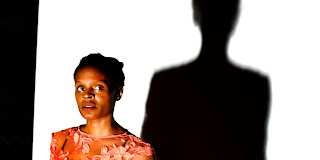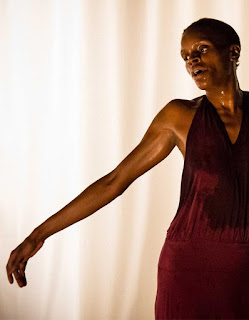On this beautiful day that bore the great dancer Katherine Dunham and prolific science fiction writer Octavia Butler, it seemed a profound time to introduce a phenomenal multidisciplinary artist whose fascinating interplay of candid performance and dance bring a necessary emergence into the contemporary art world.
 |
| Still from Bronx Gothic directed by Peter Born. |
Okwui Okpokwasili is an Igbo-Nigerian American born in New York City on August 6, 1972 to parents who fled the Nigerian civil war. She attended Yale University. Her works include the Bessie Award winning
Pent Up: A Dancer’s Revenge,
when I return who will see me,
Bronx Gothic, and
Poor People’s TV Room— performed at the 2018 Berlin Biennale.
In
Bronx Gothic, Okpokwasili is a dynamic force, moving and shifting her body with hyper-aggressive passion as the sweat rises and drenches her exerted form. She is in full control, full ownership of her direction. The heat from hot focused lamps and constant dance highlights the possession of beauty and brutality. As she breathes heavily, her kinetic motions are rapturous, erotically charged choreographies that fluidly tangles the art of performance into the clutches of dance, purposely showing that one entity cannot exist without the other. While contemporary art history has celebrated such conceptual acts like Christopher Lee Burden who used his own body as the medium (including getting shot by an actual bullet), Okpokwasili incorporates generational turmoil into her body as though receiving evocative messages from ancestors to move in present time from the past. This Black body has phenomenal grace and energy, creating a sense of fear and drama that can trigger both anticipation and into the audience. How far can her long limbs reach and pivot? Will she collapse from too much fast paced exercise?
On the
Foundation of Contemporary Arts, she shares her artist statement: “I'm interested in stories as markers of presence, of absence, of perspective, of inclusion, and of exclusion. A story can make a slight indentation in a communal consciousness. But how is a story carried—in the body, between bodies? I'm interested in a story that leaks out of the body and signals the psychic and fraying seams of the person telling it. Live performance is a unique opportunity for a physiological and psychic exchange between the watcher and the performer and the simultaneous transmission of the “story." There is, in the best circumstance, an enveloping, intangible skin that winds around both performer and audience, ensnaring, mesmerizing, appalling and enlivening. I write text and develop a physical language for the characters, an external manifestation of an interior psychic condition. Within the narrative there is a point of view or a persona that becomes the primary focus in constructing a movement vocabulary.”
 |
| Poor People’s TV Room still, ICA Boston, photo by Ian Douglas. |
Okpokwasili has received an MacArthur Genius Grant, a Doris Duke Award, an Alpert Award, a United States Artists Award, the Lower Manhattan Cultural Council’s Extended Life Program, and New York Foundation for the Arts Fellowship for Choreography. She has also been nominated for the Drama Desk Award and the Lucille Lortel Award for her work in an adaptation of Ntozake Shange’s
for colored girls who have considered suicide when the rainbow is not enuff. Her commissions include institutions and spaces at the Walker Art Center in Minneapolis, Minnesota, Danspace Project in New York City, New York, and Jacob’s Pillow in Becket, Massachusetts.
Okwui Okpokwasili currently resides in New York City, New York with her family and has won a National Endowment Foundation for the Arts Grant to create new work with Wesleyan University in Middletown, Connecticut.








Comments
Post a Comment